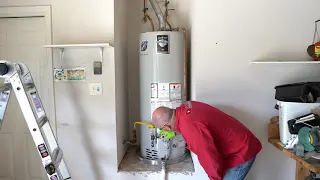Embarking on a journey as a plumbing apprentice is an exciting step toward a rewarding career in the trades. However, the path is not without its challenges. In Top 5 Challenging Things About Being an Apprentice, we delve into the most common obstacles apprentices face and provide actionable strategies to overcome them. Whether you’re just starting out or looking to support someone in the field, this guide will help you navigate the complexities of apprenticeship with confidence.
Introduction
Becoming a plumbing apprentice involves more than just learning the technical aspects of the trade. Apprenticeship programs are designed to equip you with the skills, knowledge, and work ethic necessary to excel in the plumbing industry. However, the journey can be fraught with challenges that extend beyond the classroom and the job site. Understanding these challenges and knowing how to address them is crucial for your success and growth in the trade.
1. Finding an Apprenticeship
The Competitive Landscape
One of the first hurdles aspiring plumbers face is securing an apprenticeship. Many companies prefer third or fourth-year apprentices, making the entry-level positions highly competitive. The process often requires relentless effort in reaching out to companies, applying for positions, and sometimes starting as a laborer or helper before advancing to an apprentice role.
Strategies to Secure an Apprenticeship
- Persistence is Key: Don’t get discouraged by initial rejections. Continue calling companies, visiting their offices, and expressing your interest.
- Start as a Laborer: Be willing to begin in entry-level positions such as a laborer or helper. Demonstrating your reliability and positive attitude can lead to apprenticeship opportunities.
- Professional Presentation: Dress neatly, prepare a solid resume, and practice your pitch. Making a strong first impression can set you apart from other candidates.
- Follow-Up: Regularly follow up on your applications. Consistent communication shows your dedication and eagerness to join the trade.
2. Acquiring Tools and Proper Training
The Importance of Tool Proficiency
As a green apprentice, you might not immediately get access to specialized tools. However, understanding how to use the right tools safely and efficiently is essential. Improper use of tools can lead to accidents and subpar work quality.
Best Practices for Tool Acquisition and Training
- Learn from Professionals: Request hands-on training from your journeyman. Don’t hesitate to ask for guidance on using unfamiliar tools.
- Utilize Online Resources: Supplement your training with reputable online tutorials and instructional videos to build your knowledge base.
- Invest in Quality Tools: Over time, invest in your own set of tools. High-quality tools can make your work easier and more efficient.
- Safety First: Always prioritize safety by wearing appropriate Personal Protective Equipment (PPE) and following safety protocols when handling tools.
3. Working Independently
Transitioning from Apprentice to Independent Worker
As you gain experience, you may be tasked with working more independently. This transition can be challenging if you’re not confident in your skills or decision-making abilities.
Tips for Building Independence
- Trust Your Training: Rely on the knowledge and skills you’ve acquired through your apprenticeship. Confidence in your abilities will grow with experience.
- Seek Feedback: Regularly ask for feedback from your journeyman to identify areas for improvement and build your competence.
- Take Initiative: Look for opportunities to take on more responsibilities and demonstrate your capability to handle tasks independently.
- Learn from Mistakes: Mistakes are part of the learning process. Use them as opportunities to refine your skills and avoid repeating them in the future.
4. Managing Plumbing School Workload
Balancing Classroom and Job Site Learning
Plumbing school can be overwhelming, especially when trying to balance theoretical learning with practical, on-the-job training. The volume of information packed into a short period can be daunting for many apprentices.
Strategies for Managing Educational Challenges
- Time Management: Develop a structured schedule that allocates sufficient time for studying, attending classes, and hands-on work.
- Active Learning: Engage actively in both classroom and job site training. Ask questions, participate in discussions, and seek clarification when needed.
- Supplement Learning: Utilize additional resources such as textbooks, online courses, and study groups to reinforce your understanding of complex topics.
- Stay Organized: Keep your study materials and notes well-organized to make revision easier and more effective.
5. Building a Relationship with Your Journeyman
The Mentor-Apprentice Dynamic
A positive relationship with your journeyman is crucial for your development as a plumber. Understanding their expectations and learning how to effectively communicate and collaborate can significantly impact your apprenticeship experience.
Tips for a Strong Mentor-Apprentice Relationship
- Clear Communication: Regularly communicate with your journeyman about your progress, challenges, and goals. Open dialogue fosters mutual respect and understanding.
- Show Reliability: Consistently show up on time, complete tasks diligently, and maintain a positive attitude. Reliability builds trust and confidence in your abilities.
- Be Proactive: Take the initiative to assist with tasks, ask for additional responsibilities, and demonstrate your commitment to learning and growth.
- Seek Guidance: Don’t hesitate to seek advice or mentorship beyond just task-related questions. Building a rapport can provide valuable insights and career advice.
Conclusion
Being a plumbing apprentice is a demanding yet rewarding journey that involves overcoming various challenges. From securing an apprenticeship and mastering tools to managing educational workloads and building strong professional relationships, each hurdle presents an opportunity for growth and development. By understanding these challenges and implementing effective strategies to address them, you can navigate your apprenticeship successfully and pave the way for a thriving career in plumbing.
Ready to Start Your Plumbing Apprenticeship?
If you’re ready to embark on a plumbing apprenticeship or looking to support someone in the trade, visit LeakProo.com for resources, tips, and professional guidance to enhance your learning and career development. Equip yourself with the knowledge and tools needed to excel in the plumbing industry today!




